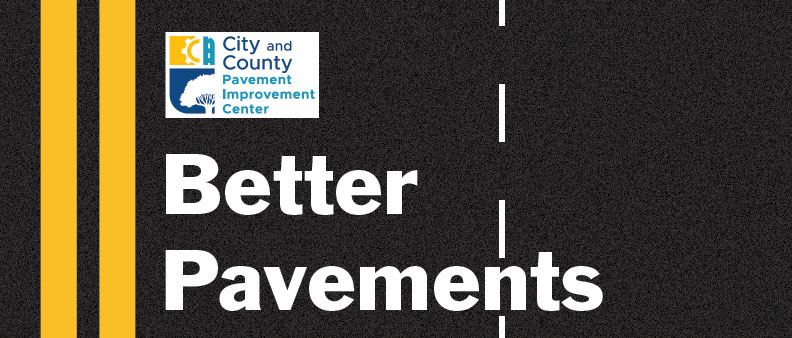City and County Pavement Improvement Center (CCPIC): Supporting Local Government to Make Their Pavements Better

If we are going to operate ground transportation, we are going to need pavement, regardless of how those vehicles (cars, trucks, bicycles, feet) are powered. Leaving aside the question of how much pavement we want or need, pavements directly contribute to global warming throughout their life cycle. They require: materials extraction and production, transport, construction, maintenance, rehabilitation, reconstruction, and demolition (“end-of-life,” although they seldom really die, they get reused or repurposed). Pavements also affect vehicle emissions by impacting vehicle life-span and the amount of energy needed to propel vehicles.
To reduce emissions and help local governments maximize the value of their pavement dollars, a group of California universities and local governments created the City and County Pavement Improvement Center (CCPIC). The center provides cities and counties with training, tools, guidance, and outreach regarding advanced, cost-effective, and sustainable pavement practices. Many of these are available through the CCPIC website.
The CCPIC resources address the three main strategies that are currently used to reduce global warming emissions from the pavement life cycle:
- Better engineering and construction quality at the outset of a project to minimize the environmental impacts of subsequent maintenance and rehabilitation. About 95% of all pavement spending is on keeping existing pavement functional.
- Keeping pavements smooth and choosing the best pavement type to reduce vehicle fuel use and prolong vehicle life.
- Better timing and treatment selection in pavement maintenance and rehabilitation through improved use of pavement management systems. These systems include low-impact preservation treatments and selection of optimal rehabilitation strategies for the pavement type and condition, climate, and traffic.
One of the projects that used CCPIC resources was the Fulton Road Reconstruction, in Santa Rosa, which won the 2021 overall award in the California’s Outstanding Local Streets and Roads Project Awards. The section of road reconstructed has 25,000 vehicles traveling on it in each direction every day. The project used a draft version of the model PCC Pavement Specifications from the CCPIC for the design of the materials and construction. Because of these and other strategies used on the renovation project, it is expected to require minimal maintenance and last longer—which will conserve funding, reduce environmental impact, and eliminate additional road work leading to traffic delays and hazards.
The CCPIC will continue expanding its training program, launching a pavement engineering and management certificate program, producing more model specifications, software tools, and technical guidance, and continuing outreach to local agencies. Support for CCPIC comes from SB1 funds from the UC Institute of Transportation Studies (Davis, Berkeley, Los Angeles and Irvine) and the California State University Transportation Consortium (Mineta Transportation Institute).
———
John Harvey is a professor of Civil and Environmental Engineering at UC Davis and Director of the UC Pavement Research Center and the City and County Pavement Improvement Center.
Thank you for your interest in the UC Davis Institute of Transportation Studies. Subscribe today to keep up with the latest ITS news and happenings.
